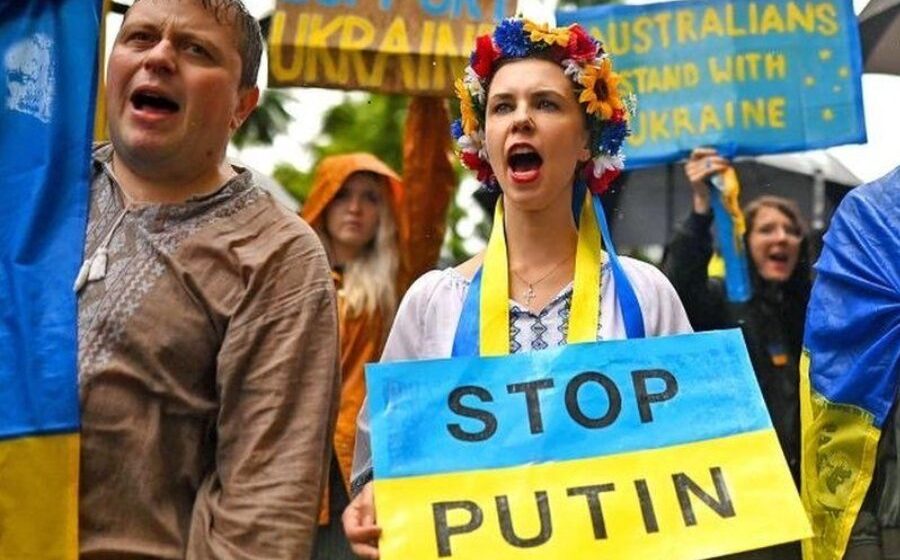Dmytro Matsypura is boiling with anger about Russia’s assault on his homeland as he addresses an anti-war rally in Australia’s biggest city.
A university professor in Sydney, Matsypura says he’s willing to fight in Ukraine.
“I can do much more being here and helping, but if necessary I have no reservations to pick up a gun [and] go,” he tells the BBC. “My father is sitting with his hunting rifle – at the window – waiting for the invaders to come in so that he can shoot them, and my father is over 70 years old.”
With both his parents and in-laws in Ukraine, he tells me he is “worried sick”.
“We don’t sleep very much. It’s a nightmare I wouldn’t wish on anybody,” he says. “The whole invasion fills me with rage towards this army that came to invade us, and I have a hard time containing that.”
Kyiv is 15,000km (9,320 miles) from Sydney, but for many in the Ukrainian diaspora the conflict feels unbearably close.
Inside the St Andrews Ukrainian Catholic Church on a rainy Sunday, the Melbourne-born priest, Father Simon Ckuj, tells the congregation that forgiveness is a virtue.
“If we allow ourselves to be overcome by our human passions, by our anger and, God forbid, by our hatred, then we are fallen,” he says. “We become no better than the enemy doing the work of the evil one.”
After the service, Father Ckuj explains his reaction to the Russian invasion.
“At first it was shock. Now it is an uncontrollable grief,” he says. “Do we pray for [Vladimir] Putin? Yes, we have to pray for Putin for his conversion, for him to withdraw from Ukraine, for him to do penance and for him to face the consequences of his actions.”
Outside the church, the Australian flag flies alongside its Ukrainian counterpart – a blue and yellow emblem that has become a symbol of global resistance.
“I am proudly Australian but… being Ukrainian is part of my identity,” says Teresa Huzij, whose grandparents fled Ukraine after World War Two. For her elderly grandmother, history feels like it is being repeated.
“My mother’s mother, who is still alive at almost 99 years of age, said ‘it’s happening again’. She came… because Australia was the only country who would take her as a widow with a child.
“I have family on my mum and dad’s side in Ukraine and I am messaging them every day by social media, hearing from them. It is excruciating. But Ukrainians have always been and will always be free because that is who we are.
Olexa Matiouk’s parents moved to Australia when Ukraine was part of the Soviet Union. His grandparents and cousins still live there.
“It’s been intense, but we are in contact with them on a daily basis. It’s a very jarring routine,” Matiouk tells the BBC. “You wake up, you log on to social media to see what’s happening and you’re hoping no-one you know has died or been injured.”
Ukrainians have a long history in modern Australia.
One of the first migrants was a soldier who sailed to Australia in the 1860s and started a sheep farm. Refugees would arrive in the late 1940s, and migration from Ukraine increased following its independence in 1991.
In Sydney, protesters have rallied every day to express their opposition to Vladimir Putin’s invasion. At times, demonstrators from Belarus and Russia have joined their Ukrainian cousins.
“It is a massive mistake. We can see it now,” says Alexey Pustovoyt, a migrant from St Petersburg in Russia, President Putin’s home city. “I can’t get it why he [Putin] decided to go. There is no excuse. You can’t do this. It’s the 21st Century.”
His condemnation is echoed by Tatsiana, a Belarusian protester.
“I do not know a single Belarusian who sincerely supports what is happening. We all pray for Ukraine; we all hope for (its) freedom,” she says.
The Australian government has said the Russian invasion is “a wholesale breach of international law [and] a completely unprovoked and unjustified attack on its neighbour”.
Prime Minister Scott Morrison said China – which has supported Russia’s economy as western sanctions bite – had more power than anyone else to bring the conflict to an end.
“I was listening for the voice of the Chinese government when it came to condemning the actions of Russia and there was a chilling silence,” he said in a speech to the Lowy Institute, a Sydney-based research organisation.
There are fears here, too, that the invasion of Ukraine has fomented a “troubling new strategic convergence” between Beijing and Moscow that could embolden China’s regional territorial ambitions.
What Morrison called a “new arc of autocracy” that would “challenge and reset the world order” also has spy chiefs worried.
“We’re going to have to work much harder to maintain the liberal quality of the rules-based order in Europe and here in the Indo-Pacific region,” said Andrew Shearer, director general of Australia’s Office of National Intelligence.
But for the Ukrainian diaspora, their world has already been upended. There is despair, but there is also defiance.
“We have this unity, we have this support,” explained Dmytro Matsypura. “It fills me with this feeling that we are not alone, and we can win this.”



